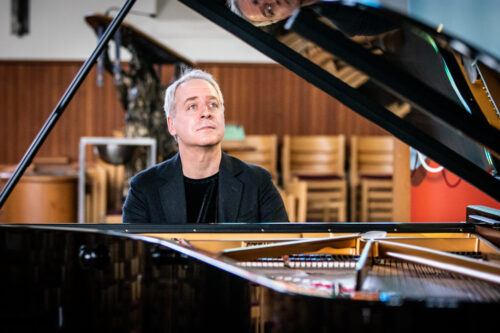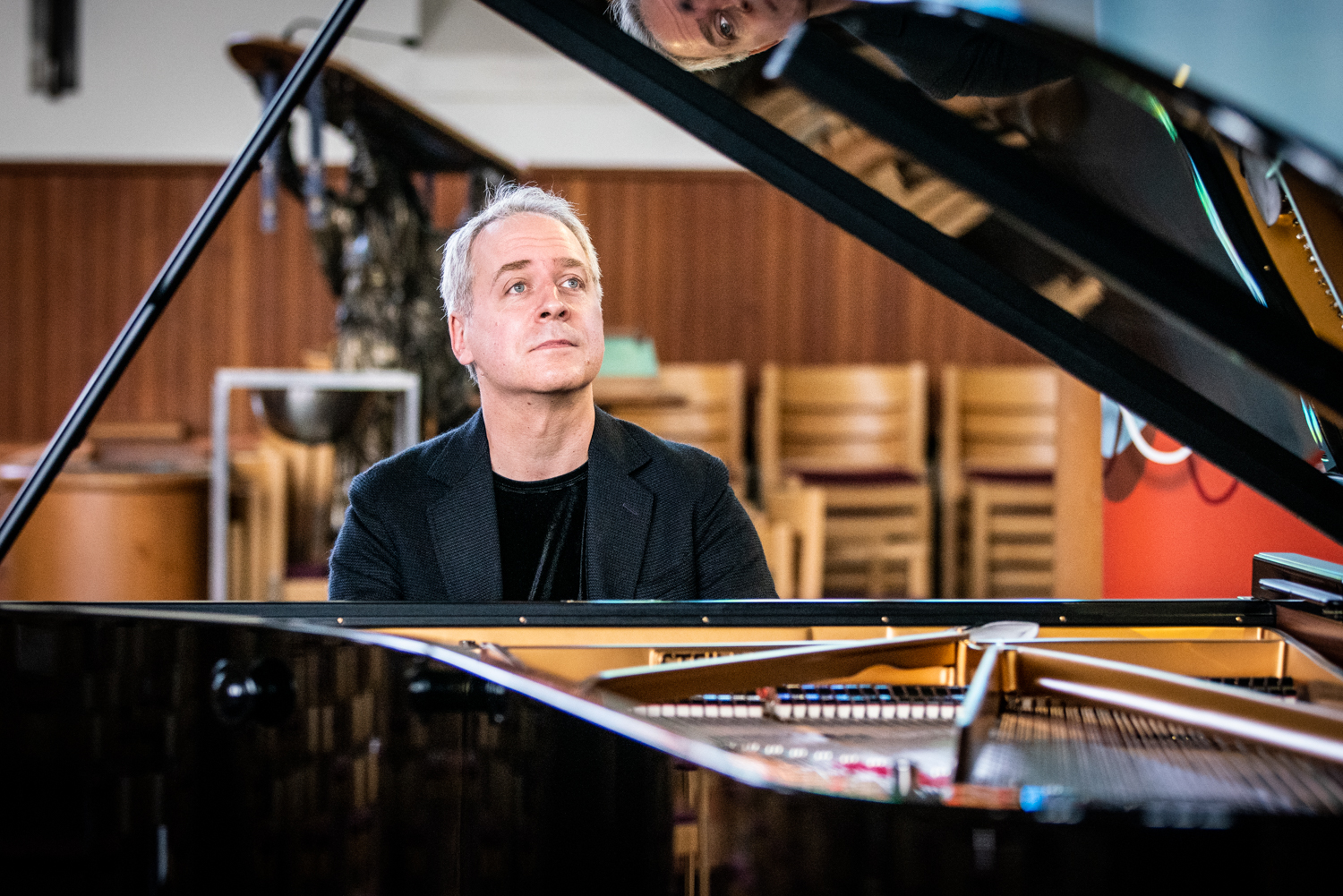
 United Kingdom Lammermuir Festival 2021 [1]: (SRT)
United Kingdom Lammermuir Festival 2021 [1]: (SRT)

Bach, The Well-Tempered Clavier Book I – Dunbar Parish Church, 10.9.2021
Jeremy Denk (piano)
Wolf, Italian Songbook (Italienisches Liederbuch) – The Brunton, Musselburgh, 12.9.2021
Roderick Williams (baritone)
Rowan Pierce & Kathryn Rudge (sopranos)
Robert Murray & James Way (tenors)
Christopher Glynn (piano)
Jeremy Sams & Louise Shephard (directors)
It has been one of those classic weeks north of the border where summer hasn’t quite marched out but is making more fuss about its exit than you would think was possible. On Wednesday, Scotland recorded its highest September temperature in 115 years (28.6 °C in the Borders), then on Thursday the whole of Edinburgh was blanketed in a pea souper of a Haar, that most tangible of sea mists that we specialise in here, so thick you could cut it with a knife and you feel it in your lungs. So, Autumn hasn’t arrived quite yet, but one of its most welcome signs has: the Lammermuir Festival.
The Lammermuir Festival is now twelve years old, and it is one of those events that has evolved a fiercely loyal local following while casting its net far and wide for both audiences and artists. Based in the sunny county of East Lothian, the festival’s selling point is to stage concerts by leading artists in some of the county’s most beautiful, tucked-away historic venues, and the festival has done such a good job of it that its reputation is sky-high. Last year it existed online only, of course, but this year it’s not only back to live audiences but it has extended by a few days so that it is a fortnight long. Bravo to that!
They have also attracted a big international soloist: American pianist Jeremy Denk is their artist-in-residence, playing four concerts over the festival’s length, and bringing a little dusting of star power with him. James Waters, one of the festival’s directors, said that they cleared every other international artist from the 2021 programme so as to give them the space and energy to bring Denk, so long has been the planning of his visit, and his opening concerts, playing Book I of Bach’s The Well-Tempered Clavier, showed why it had been worth the effort.
Denk has a hinterland with Bach, something he revealed in a chatty programme note, which explained how he sees the fugues as self-generating lives and the preludes as a friendly assortment. It is clearly a work about which he has thought long and hard, and that shows in the way he plays it. There is technical mastery, for sure, but what struck me most was the way he seems to invest each movement with its own distinctive character and colour, as though they were all different actors in a drama, each of which has its own soliloquy in which it pours out its innermost soul. However, in doing so each actor changes the environment of the overall drama so that, when he disappears, the next character pours out his heart in a different landscape.
Playing without a score, Denk was also very fun to watch, more so than with most pianists. The music seemed to take hold of him physically, and he looked into the audience as much as he looked at his hands, seeming to toss out a musical phrase to us as though to make us complicit in the musical journey. In the process, Denk seems to be talking to Bach’s musical characters, weaving them into life with a nod of his head or a jut of his chin, conversing with the dramatis personae as though to draw out their characters, foibles and idiosyncrasies.
He conceives Book I as a journey from, in his words, the Atlantic to the Pacific: if the opening C major prelude is all about crystalline clarity and purity of vision, then the final B minor fugue is newly exploratory, always pushing forward as though pressing into something new. En route, the C-sharp prelude gave us a blithe dance around the sun, while the D major one was skittish and playful, with a fabulously imperious fugue. Denk turned the E major prelude into a graceful galliard, paired with a fugue that was assertive to the point of rudeness, and the B major prelude, the end of the major-key journey, seems to shimmer and glisten under his fingers, a world away from the clean directness of the opening C major.
It is in the black-key movements that he was at his most spellbinding, however. Those unusual keys like D-sharp minor and F-sharp major seemed to call something particularly deep out of Bach, and Denk invested them with a particular shade of colour that made them gripping to listen to. The C-sharp minor prelude, for example, was shot through with dusky sadness, while its fugue seemed to bear the burden of a terrible tragedy; and the E-flat minor prelude seemed broken, fragmentary and strange. The B-flat minor movements were so ripe with emotion that they sounded dangerously modern. But in many ways that is what Denk managed to do with the whole book: he made Bach sound as contemporary as Boulez or Cage, someone who speaks to us powerfully today and plumbs our emotions powerfully.
As for the playing, it was as assured as it was poetic. Only once, in the opening C major prelude, did the join between left and right hands seem too obvious. Otherwise, each movement was summoned into being with the masterful assurance of a wizard, weaving a spell of crystalline clarity and pellucid beauty that surrounded the audience with magic as the sun set outside and the church interior was gradually pulled into darkness.
Mediterranean sunlight, on the other hand, was the keynote of a performance – nay, staging – of Hugo Wolf’s Italienisches Liederbuch, albeit one that took place in the darkened interior of Musselburgh’s Brunton Theatre. The staging is the idea of Jeremy Sams and Louise Shephard, though it focuses principally on character development rather than scenery and could be staged anywhere that has a piano and five chairs.
As conceived – it would appear – by Sams and pianist Christopher Glynn, they see in the 46 songs of Wolf’s cycle a range of emotions and events that could easily be applied to characters and scenarios that we recognise from a thousand dramas and sitcoms. All it takes is a little arrangement and allocation of the songs, together with a snappy English translation, and you have a Cosí fan tutte-like situation of two couples and an older, Don Alfonso-like character, who observes their foibles from a distance. We see the characters fall in love, fall out, reconcile and, finally, reach an equilibrium with one another from which the baritone, the Don Alfonso-ish Roderick Williams, is excluded thanks to his cynicism.
It is a neat idea, and the performers gave their all to it, though they were not helped by the conditions of the venue which, with its soft furnished interior, isn’t a place for voices to flourish. The ladies, in particular, sounded tethered and held back, through no fault of their own: Rowan Pierce, especially, couldn’t let her luxurious soprano fly loose, though it was less of a problem for the men who, if anything, benefited from the acoustic bringing their voices closer to the ear, and that closeness helped all five singers to sing the words with impeccable clarity.
A performance like this is probably the best way in which to experience Wolf’s cycle as a whole. Each of these songs is a little jewel, many of them not much more than a minute long, distilled studies of emotion that, individually, carry a huge amount of power, and they would be wearying to hear altogether in a conventional recital. I am not sure, however, that even Wolf would have advocated digesting them all in one sitting, even like this. The staging was a useful scaffold but consuming all the songs together felt a bit like eating 46 portions of chicken liver pâté: anything up to a dozen or so might have been lovely, but more than that begins to cloy. It reminded me that I had only ever encountered songs from the Italienisches Liederbuch sung as a selection in a mixed recital. Now I know why.
Simon Thompson
The Lammermuir Festival runs until Monday 20th September, for information click here.
